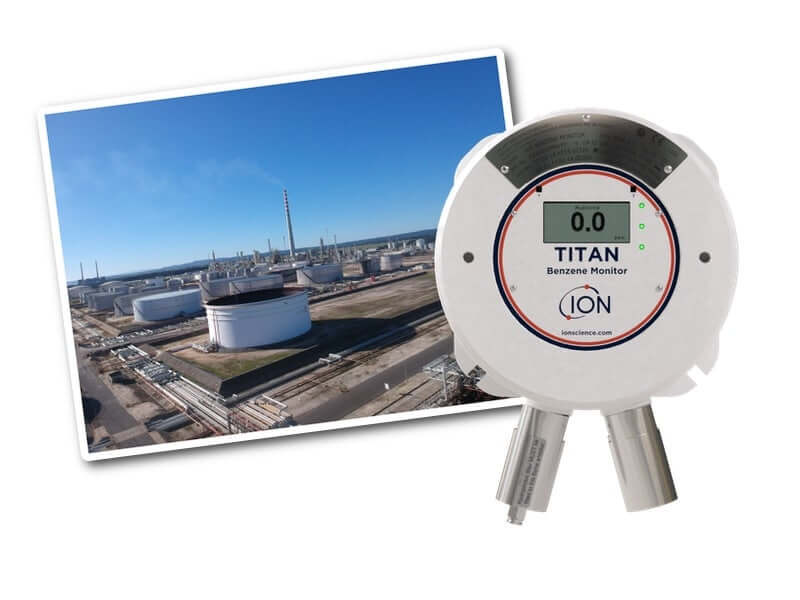
Titan is a continuous benzene specific monitor specially designed for ambient benzene in petrochemical applications – providing the ultimate protection of workforce, environment & plant.
Further underlining its position as a global leader in the design and manufacture of high-performance gas detection instrumentation, Ion Science has unveiled the world’s first continuous benzene-specific monitor. The revolutionary Titan has been specially designed for the accurate and reliable detection of ambient benzene in petrochemical applications where traditional methods suffer cross interference – providing the ultimate real-time protection of workforce, environment and plant.
Benzene is a constituent of crude oil and becomes gaseous during petrochemical processing but it is also used as a solvent in the production of drugs, plastics, synthetic rubbers and dyes. It is a carcinogen with very low work exposure limits making sub parts per million (ppm) measurement an essential requirement.
Traditional photoionisation detection (PID) monitors easily detect benzene but they also identify other less harmful volatile organic compound (VOC) gases that are normally present at the same time.
As the world’s first truly selective wall-mounted benzene monitor, the Ion Science Titan is set to be a real game changer for the petrochemical industry and refinery applications in particular. Incorporating the well proven Ion Science MiniPID technology at the heart of the instrument, ‘Titan’ is highly sensitive and capable of detecting benzene levels down to 0.1ppm and up to 20ppm.
Offering rapid and accurate detection, Titan, continuously samples and analyses the environment to provide real-time feedback of ambient benzene levels. When a sample is taken, the benzene component is chemically filtered using a robust separation technology so ensuring no false-positives are measured with potential cross-contaminating compounds in the atmosphere.
Ion Science’s ‘Titan’ features a clear display and provides users with an immediate warning alarm system when hazardous levels of benzene are detected ensuring the on-going safety and protection of workers.
The instrument provides two relays with configurable levels to integrate into site alarm systems. Flashing lights are used as an alarm signal to give a clear indication when benzene levels present.
‘Titan’ stores data internally and remotely connects to a PC. Its continuous, real-time measurement facilitates the analysis of trends and allows activity levels to be accurately identified.
Designed to operate in conditions ranging from -20ºC up to +60ºC ,Titan is unaffected by changes in ambient temperature. It incorporates two temperature regulation systems to ensure critical components perform optimally.
Modular in design, Titan is easy to service and designed to operate for as long as possible without intervention. Working parts can be easily removed and serviced, or replaced by another ‘plug and play’ service module. It also provides removal of particulate contamination in the air stream to provide long-term service free sampling.
Like all Ion Science PID instruments, ‘Titan’ utilises the company’s unique patented Fence Electrode technology for unrivalled resistance to humidity and contamination. This key feature makes ‘Titan’ ideal for extended operation in harsh environments.
Duncan Johns, Managing Director at Ion Science says: “Like most Ion Science products, the ‘Titan’ has been developed as a result of listening to our customers and understanding the changing needs of our target markets. The petrochemical industry has been clamouring for a benzene-specific monitor for some time so we’re excited at being able to offer the ‘Titan’ as a robust, reliable and accurate solution.
Duncan adds: “The ‘Titan’ utilises Ion Science’s 25 years’ experience and is the result of significant research and development. It is truly revolutionary and a further reinforcement of our market-leading position at the forefront of global gas detection instrumentation.”
Titan is designed to IP65 and meets ATEX / IECEx hazardous area safety approvals.











